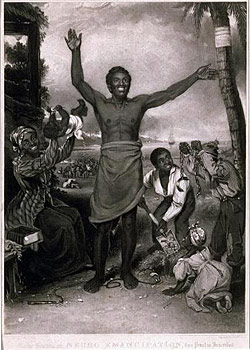
Unit 3: Revolutions and Reaction
Lesson F: Costs and Benefits of Industrialization in The West
Activity 4: The Free Labor Revolution
The industrialization of the world economy shed light on the issue of slavery. The shift from agriculture to industrial manufacturing favored paid workers, who were motivated to increase production by the possibility of higher wages. Slaves had less incentive to work harder because they were generally enslaved for their entire lives with little hope for freedom.
The Enlightenment, a period of philosophical ideas that challenged slavery, preceded the Industrial Revolution. Enlightenment thinkers used the ideas of equality and freedom to criticize the African slave trade and the cruel system of slavery that supported the farming economies of the Americas. Religious groups, such as the Quakers, questioned the fairness of slavery, and organized anti-slavery organizations and groups. Governments took note and debated whether to emancipate the slaves and ban the slave trade. Finally, slaves themselves took matters into their own hands and rebelled against slave owners. Although these revolts were generally unsuccessful and resulted in many deaths, many people in Europe and some in the Americas soon supported abolition.

Painting Entitled, "To the Friends of Negro Emancipation," Celebrating the Abolition of Slavery in the British Empire in 1833. [1]
Classroom Activity - Free Labor Revolution
Directions: In order to better understand the events that led to the abolition of slavery and the slave trade, complete the following activity. Review the timeline of events from the era of African slavery. The events listed all contributed to the eventual abolition of the slave trade and slavery in Europe and the Americas. As you review each event, think about which category of causes of abolition it best represents based on the definitions below:
- political - related to changes to government such as the Atlantic Revolutions, Enlightenment ideals, or laws passed by governments
- religious - related to ideas of a church or religious group
- economic - related to economic ideas or changes of the Industrial Revolution
- social - related to slave revolts or rebellions
The abolition of slavery was yet another consequence of the Industrial Revolution. Slaves had paid much of the cost of economic development of the early modern world. Finally, they benefited from these changes through abolition of slavery and freedom. However, the adjustment to free life brought its own challenges.
Move to the next activity to review and conclude the lesson.
Page Notes:
[1] Source: This image from http://en.wikipedia.org/wiki/File:FriendsOfNegroEmancipation.jpg is in the public domain because its copyright has expired.

